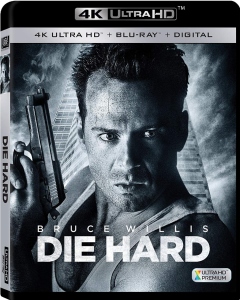Is “Die Hard” (1988) a Christmas movie? According to a new poll from Public Policy Polling, it is not. Sixty-two percent say it’s not a Christmas movie, 13 percent say it is, and the rest are undecided. The debate is more balanced (and heated) – perhaps with an edge toward those saying it is a Christmas movie – on sites that are likely to draw cinephiles, such as “Die Hard’s” IMBD page or the comment threads below this Entertainment Weekly article.
A Christmas movie – and a great one
The EW piece nicely outlines 10 reasons why “Die Hard” is not only a Christmas movie but also a darn good one.
Some of the Christmas tropes are a bit below the surface because writers Jeb Stuart and Steven E. de Souza (working from Roderick Thorp’s novel) and director John McTiernan don’t hit us over the head with them: The estranged family, Gruber-as-Grinch, McLane being stuck in air ducts and elevator shafts like Santa in a chimney, and the fact that McLane’s wife is named Holly.

“Die Hard” (1988)
Director: John McTiernan
Writers: Jeb Stuart, Steven E. de Souza (screenplay); Roderick Thorp (novel)
Stars: Bruce Willis, Alan Rickman, Bonnie Bedelia
The unkillable-McClane-as-Jesus metaphor – complete with crucifix-style wounds on his feet — shouldn’t be overlooked either. And I see Police Chief Robinson and the two FBI agents named Johnson as a bunch of Scrooges. They are way too over-the-top to be serious portrayals of public officials, which means they are either parodies or Scrooge archetypes.
Given the overall context of the film – which is serious, rather than parodic – I see them as Yuletide archetypes. Meanwhile, the one competent cop, Al, goes through a classic Christmas redemption arc: He stops wallowing in his own self-loathing over shooting a kid and kills Gruber’s last henchman at the end, thus saving many lives.
Packed with holiday references
“Die Hard’s” surface, of course, is packed with Christmas references. In addition to the movie taking place on Christmas Eve, the film is jammed wall-to-wall with dialogue, visuals and music about the holiday. Argyle, John’s limo driver, pumps Run-DMC’s “Christmas in Hollis” and the closing credits roll to “Let It Snow.”
Less talked about – but still obvious, if you listen for it – is the fact that Michael Kamen’s score regularly features riffs from holiday songs.
I suspect some of the 62 percent simply haven’t watched “Die Hard” recently, or at all; they just know the general outline of an action movie in a skyscraper with a bunch of explosions. If everyone had watched “Die Hard” right before being polled, the results would no doubt be different.
That having been said, there is a significant cohort of people who ARE familiar with “Die Hard” who claim it isn’t a Christmas movie. They acknowledge that it takes place on Christmas Eve but say that fact is superficial – the events could take place anytime, and the film isn’t tied into themes of the holiday.

The EW piece shows how off base the latter argument is. As for the former point, I’ll note that Gruber’s group likely chose Dec. 24 as a good day for the attack because the building would be more lightly populated.
Narrow definition eliminates other Christmas classics
Even the Renegade Cut video tackling the question of “Die Hard’s” Yuletide bona fides came to the correct conclusion via the wrong path – that it’s a Christmas movie because people say it is. “We as a society have dubbed it a Christmas movie in a very democratic way,” the narrator says. “For many, Christmas means another viewing of ‘Die Hard.’ ”
If that is the deciding factor, then Renegade Cut might have to consider its stance in light of this new poll that indicates the masses do not consider it a Christmas movie after all.
The Movie Talk video on this issue makes a stronger argument in favor of “Die Hard” being in the Christmas canon. It smartly points out that a person could legitimately exclude “Die Hard” only if they applied the most narrowly tailored definition of “Christmas movie”: One that features long-established Christmas characters.
Therefore, anything with Santa Claus, elves, Rudolph, Frosty or the Grinch would qualify (and even some of those characters might be borderline). But “Home Alone” would not qualify, nor would “Gremlins,” nor would “It’s a Wonderful Life.” And even National Lampoon’s “Christmas Vacation” wouldn’t count!
Yet few people who deny “Die Hard” its place in the Christmas pantheon put a barrier up against the aforementioned films – especially not “Christmas Vacation,” which is a no-brainer because of its title. But that’s shallow reasoning; by that logic, “Die Hard” would make the cut if it were called “A New York Cop’s Christmas Vacation.”
Set the titles aside, and “Die Hard” shares almost all of the traits that make “Christmas Vacation” a Christmas movie – the time when it takes place and the focus on family.
Northern climate bias
In addition to unfamiliarity with “Die Hard” on the part of voters, I think a second major reason for the 62 percent voting against it is a Northern-climate bias. I grew up in Fargo, N.D. – where White Christmases are the norm — and I honestly never considered the bias until I moved south and began experiencing wonderful air-conditioned, non-White Christmases.
The bias is hard to overcome – even for people who don’t live in a so-called Christmasy climate. Just picking a couple Christmas CDs off my shelf and looking at the titles, I see “Sleigh Ride” (which requires snow), “Baby It’s Cold Outside,” “Let It Snow,” “Winter Wonderland” (which implies snow) and “White Christmas.”
Even if the titles don’t indicate snow, ice or chilly outdoor activities, the lyrics do. For example, the “home” in “I’ll Be Home for Christmas” is one with snow.
Of course, Christmas is not only celebrated in Northern climates. It is celebrated by Christians and secular people throughout the world, including the Southern Hemisphere, where it is the height of summer on Dec. 25.
Even if we look only at the U.S., a country with lots of Christians and secular Christmas celebrators, this NOAA map shows that the vast majority of the population will not experience a White Christmas. A good chunk of the country has a nearly 0 percent chance of a snow-covered holiday; meanwhile, very few places have a near-100 percent chance.
This is our Christmas movie and we love it
This AccuWeather.com article outlines the roots of the bias: Most of the staple modern Christmas songs, poems and stories originated in the heart of Western Civilization – Europe and the northeastern U.S. – in the 1800s, which was a particularly snowy century.
“Die Hard” – set in Los Angeles – has to fight against two centuries of ingrained cultural (and pop-cultural) bias. “Christmas Vacation” and “Home Alone” are both set in frigid Chicago. “Gremlins” is set in Kingston Falls, N.Y., during a snowy winter.
As Los Angeles native Rachel Bloom put it in her “Crazy Ex-Girlfriend” song “California Christmastime”: “You can take your snow and shove it/This is our Christmas and we love it.” I won’t be quite so harsh, but I will point out that neither the religious nor secular meanings of Christmas are dependent on climate.
Most Christmas movies include cold weather to appeal directly to people’s expectations, but it is not strictly necessary. “Die Hard” proves as much. So, to the people who can’t grasp the notion of a Yuletide movie in a warm climate: “Yippee-kiyay … and Merry Christmas!”

